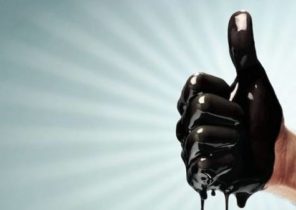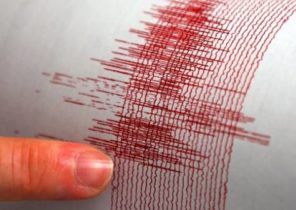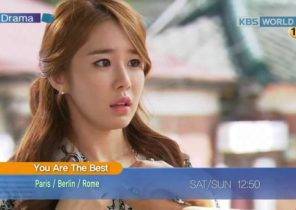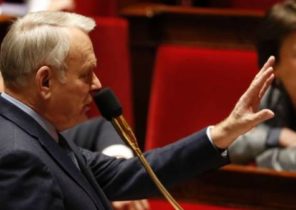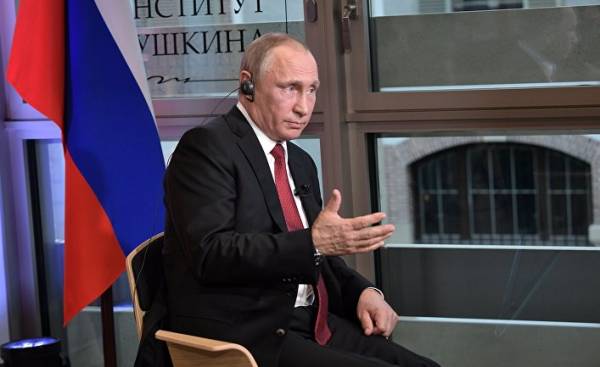
“Don’t need to escalate, no need to invent mythical Russian threat, hybrid warfare, and so on. Themselves head and share, and then scare themselves, and on this basis to formulate future policy.” So, whether offended or pleading, addressed to a European audience Vladimir Putin in a recent interview with the French newspaper “Figaro”.
Conciliation was and the tone of the Russian President during a speech at the St. Petersburg economic forum on June 1. Putin said that the Russian hacker who the US accused of meddling in the U.S. presidential campaign, nothing to do with the Russian authorities and could not exert a serious influence on the election results: “Hackers are the same people free”…
However, over the past three years, relations between Russia and Western countries came to such a depressing state, to convince Europeans and Americans in the harmlessness of Moscow’s policy will not be easy. The more that evidence to the contrary is not so little, and the aims and motives of this policy in the West is still prevailing differences. After all, any clear logic in the actions of the Kremlin with the beginning of the Ukrainian conflict in 2014 is not seen always.
What, exactly, does Russia want? This question do not cease to ask many politicians and researchers in Europe and the United States. The article under this title — “What does Russia want?” a leading political analyst with the European Council on foreign relations (European Council on Foreign Relations, ECFR) Kadri Liik offers its original version of the answer to this question — as well as the assessment of the seriousness of the Russian threat. According to her, this threat “comes not so much from Russia as from the Western countries. What makes Russian intervention at all worth mentioning — the disappointment of the population in Western countries and the widespread doubts about Western socio-political model. If the West is to overcome their own fundamental problems, the threat from Russia will be swept away — as well as in Western Europe due to the success of the Marshall plan was stopped communism”.
Learn more about what we want to achieve as a result of the current standoff between the Kremlin and the West, why Vladimir Putin is not so popular among Europeans as it may seem, and than Donald trump reminds of Boris Yeltsin, Kadri Liik said in an interview with Radio Liberty.
— On Vladimir Putin and in General about the people who are now in power in Russia, formed two opposing views that are often expressed by Western politicians. The first is a KGB-Imperials, which have their own ideology — a sort of cocktail of Eurasianism, Russian nationalism and nostalgia for the Soviet Union. And second, it does not Imperials, just cynical pragmatists who will use any ideology for their own political or economic purposes. In your opinion, which view is closer to the truth?
— In my opinion, neither one nor the other, although both have some elements that are true. My vision of Putin never changed. I always thought he is a Russian statesman, just his idea of what is good for Russia, maybe not quite modern and has a lot of disadvantages. But I don’t think he’s a cynic, which the presidency needs only as a means of self-enrichment. Rather, all of these assets, which many say, you need him as a means of consolidating power. It is important for him, the state is evident in all his speeches. He appreciates the people who serve or have served the state well, whatever it was — tsarist, Soviet, and so on. All that strengthens the state, he loves all that, in his opinion, does not strengthen he doesn’t like, at least, treat this suspiciously.
You in his article called social conservative values, which the Kremlin is now promoting, Soviet in content. What do you mean? It is statism, Putin, about whom you just said? But in this case, what specifically Soviet in its ideology?
— Yes, I think the strengthening of the Russian state, as he understands it, is what he needs. The definition of “Soviet” I refer rather to the system of values. In my opinion, Soviet values do not quite fit into the Western liberal-conservative scale. For example, the homosexuals, the Soviet Union had a bad attitude, they were persecuted — and it continues in Russia today. But, on the other hand, abortion was almost the main means of family planning that in the conservative system of values does not fit. In the Soviet Union was a specific set of views on what is possible and what is not, what is good and what is bad. It is difficult to differentiate and understand the Western system of coordinates.
— How is combined with the Soviet scale of values what is happening now is the official Orthodoxy resurgent cult of the kings, of the monarchy? This is not Soviet things, purely ideologically.
Yeah, they’re not Soviet. But I think this is to some extent just the scenery. The Kremlin is looking for the means with which to mobilize the society, to designate enemies, marginalize dissent, and so on. But on the other hand, these ideologies are placed just in the direction of statism. For example, Christianity. During the Soviet era, the gap state with the Orthodox Church, perhaps the regime is not strengthened. Putin understands this, hence the rehabilitation of the official Orthodoxy, closely cooperating with the government. But the elements of fanaticism that sometimes occur there is likely a tool, not a goal.
— It is often said about the growing influence of this mixed Soviet and non-Soviet at the same time, Putin’s ideology in the West. It is known that in Western countries, primarily in Europe, the Kremlin sympathetic to right-wing and partly left-wing radicals and populists. Why? This happens for ideological reasons, or rather it is a pragmatic choice, the desire to find a strong ally abroad, which if anything will help — perhaps even financially, as we have seen in the National front of marine Le Pen?
Sincere there is something, maybe there is, but not enough. I say, I’m not sure that marine Le Pen do so enthusiastically refers to Putin’s Russia. Maybe it’s her kind of model, and maybe just a means: it is necessary to take help where offered. For Putin himself, by the way, Europe is also not looking as a model, some kind of hero. My next big job will be on EU-Russia relations, there co-authors use survey data from all countries of the European Union. There is this question: is President Putin a hero, or appreciate a person in the public opinion of your country? And even in the southern and South-Eastern Europe, where we can assume that there is some kind of visible sympathy, it turns out that it is not so. Russia’s interesting how a country that, say, wary of immigrants as some kind of alternative to US dominance, but Putin himself, with a few small exceptions, is not very popular. It is even surprising.
Often, however, happens that where the less you know, there’s more to love. My colleagues in our Madrid office is very interestingly told one what you start to do comments on the website of the leading Spanish newspaper “El Pais”, when Latin America is waking up when it’s morning. Immediately there is a rise comments from those leftist, which, for example, are full of praise for Belarus, Lukashenka’s regime. For them it’s kind of nostalgic of the Communist model and they love it. But the real Belarus they really did not know. The same, perhaps, with Russia. There are existing images that are not connected with reality. In Europe this model is still not quite working. There are some small segments of public opinion that is configured to Putin purely positive. For example, Russians in the Baltic States, which is understandable — then the ratio of the Diaspora, they have an affinity with the country of origin. And so it appears that Putin is less popular than I thought.
— Your essay is called “What does Russia want?”. In your opinion, what world order to the Kremlin? One of the stable political stereotypes is the “second Yalta”, the new redistribution of spheres of influence with the West as the Kremlin’s goal. So, or there are nuances? Russia is a supporter of the new world order or just anti-West spoiler?
— I’m trying to show in his article that “a second Yalta” is part of what Russia wants, but in principle the Russian foreign policy agenda is much broader and more systemic. To keep in its sphere of influence neighbouring countries — Ukraine, Georgia, Moldova, Armenia in the Kremlin really want and disagree with the fact that these countries had its own independent relations with the West. Moscow wants to here some right of veto. Not directly control — it’s not quite the Warsaw Pact, but some kind of veto power over foreign policy decisions have very much want to. But it seems to me that, in General, Russia wants at all the other rules of the game in the world. Or, at least, in that part of the world that matters to her is Eurasia, the middle East, relations with America and so on.
— What are these rules?
— I think that Russia does not really knows exactly what these rules should be, but it clearly knows what should not be there. Namely, those concepts that were included in the European order after the cold war: the importance of human rights, the idea that these rights should be protected on the territory of other States, using weapons if necessary. Russia is also very Gosudarstvenniy approach. What domestically is a matter of her government, the other is not. Regime change from outside is rejected unequivocally. No need for any humanitarian intervention. With regard to the Ukrainian events of 2014, Russia says, is a coup. And in the West it’s seen as a classic popular revolution. In General, the Kremlin is more of a world order of 1945.
— As it is combined with the actions of Russia itself? Here’s annexed the Crimea and intervened in Eastern Ukraine. As it can be combined with the desire for stability, for a single order? After all, such actions are undermining stability, the undermining of the order.
— Yes, exactly. It is in Russia it is difficult to explain. From what I hear, the Russian foreign Ministry was against the annexation of the Crimea, because there is just understood that the legalists approach to Russia until then was typical, it will be hugely disruptive. After the Crimea the old arguments — to say, we against the change of regime in a certain country and interference in its Affairs, because that’s illegal actions — it is not that easy to use. On the other hand, the line of explanation there, as I understand it, is this: Yes, it’s bad, but you, West, we were forced to do so, you made a revolution in the Ukraine, we were forced to react this way. And anyway, if you continue this reasoning, the annexation of Crimea is the consequence of the broken world system, which was after the cold war, in which Russia were marginalized, had no opportunity to influence the processes and so on. That is, the approach is this: your system is not working, due to the fact we were forced to behave. Right, of course, in Moscow did not speak, but in fact, if you look at the emotional undertones, it looks that way.
— After the beginning of the Ukrainian crisis, many in Eastern Europe, in particular, in your country, Estonia, was worried about possible Russian aggression. Putin in a recent interview with “Le Figaro” called such a scenario “imaginary threat” that the Europeans “scare themselves”. In your opinion, in principle, possible Russian intervention in countries such as Estonia, or Putin is right and it really phantoms?
— I think Putin’s not lying: he has no intention to enter Estonia. He had no desire to go to the Crimea — it just happened one day under the circumstances. My concern is that this could happen in the Baltic States. Not for the same reasons as in Crimea, as the Russian attitude to Ukraine is another. The Baltic States, in my opinion, in Moscow, are seen differently. Thoughts in the logic of differentiation of spheres of influence and the Baltic States is the American sphere. I think that Russia resigned. But it’s an insecure place Americans. If the Americans will harm Russia somewhere in other place, then you can hit them with here is the logic about this. Because of this unsettling, and personally I’m glad that NATO forces will stay in Baltic States, because it just gives the opportunity to prevent this attack.
We are talking about the logic of the current Russian leadership. According to your observations, how Western political elites understand this logic?
— Not too much, unfortunately. It worries me because the lack of understanding is very dangerous on this side and the other. After all, Russia now understands the thinking of the West. In Moscow very much misunderstood and in relation to the Crimea: Russia does not expect sanctions, did not expect that Germany are so hard to treat this situation, and so on. But with Western politicians is not the best picture. I think Angela Merkel has a better understanding of Russia, she comes from the former East Germany, speaks Russian and so on. But overall… a Couple of years ago, the office of Federica Mogherini (EU high representative for foreign policy. — RS) issued a note on the policy concerning Russia, where was strikingly noticeable as in Brussels do not understand what motivates Russian policy, what are her motives, what Russia wants. And then I basically see a big role for people who work in think-tanks, and researchers who are in Russia, study it and state their observations translate into a language which is understood in the West. For us there is a field for work.
— If we extend this situation not only on political elites but also on society as a whole, it is easy to see that a significant part of Russian society looks at today’s Europe as something sick, decadent, corrupted by liberalism. The nature of such assessments, how they are conditioned by propaganda, etc. is another question. Conversely, many Europeans look to Russia too, as a strange, largely the patient’s country, a sort of reserve of authoritarianism and obscurantism. When both sides see each other, roughly speaking, crazy, dippy, is it possible some dialogue? How to get out of this impasse?
— It is necessary to prove that your position is viable, then you take seriously. I think Russia is now asking the question about the viability of the European project. And in Europe, of course, is the idea that in Russia the economic downturn and soon everything there will collapse. It is not — in both cases. In Russia, all trends are bad, as confirmed by the Russian economists, but the economy is still quite strong, and these trends do not mean that all will take and fall. The stagnation can last for a long time, it is necessary to understand. In Russia, however, some extreme, bipolar attitude to the world: either / or. Very often the Russians difficult to understand the nuances, the shades of those or other phenomena. For example, in Moscow you see the European crisis, that the EU is not in the best condition, but I don’t see the energy that emerged in Europe due to the crisis. This is a positive Pro-European power. I hope the meeting with Macron Putin gave at least some idea of this new type of thinking about the energy that now in Europe there is and will work on updating the European Union. There is something to fix, there are many problems, and it is a long time. But there is a desire, as elites, and a considerable part of voters support this and not say: well, Yes, there was a European project, it is no longer working, let’s do something different.
— Do you think that Putin is still able to understand such things? After all he is almost 20 years in power, and this power is almost absolute, and, as often absolute rulers, he finds himself in a vacuum. It is known that for such people their environment says usually what these people want to hear. Putin, in your opinion, is able to perceive a different perspective on things, different values, different system?
— Of course, the effect that you describe there. Indeed, the circle of friends of Putin is not so wide, and he has his longtime prejudices. But I think everyone has a certain ability to perceive reality has been preserved there. For example, look at the so-called “Novorossia”. Now nobody talks about it, but it was a big project in 2014. Many really thought that the whole Eastern Ukraine go against Kiev, but that did not happen. And rather quickly changed course, rejected the idea of partition of Ukraine. However, it actually captured part of the Donbass and trying to use that as leverage against Kiev. However, the Kremlin took into account reality. I think that Moscow is capable of it and other things, although not immediately. But to prove it not by words but by actions.
— In Russia, vigorously welcomed the election of Donald trump President of the United States. Then slightly cooled, especially after the American attack on Syrian military base. Putin and trump have in July at the G20 summit for the first time to meet in person. In your opinion, what is the prospect for these relations, given that in America the opponents of the trump actively suspect him of some unusual relations with Russia? Around that, a lot of noise, which the current US President, of course, causes political harm. How go things?
I think they will go very weird and confusing. Not sure what Russia and America will be the friendship, but I don’t think there will be a continuous feud. In my opinion, Donald trump something very reminiscent of Boris Yeltsin. He came to power against the wishes of the elite, although he belongs to her. In his political entourage included the members of his family. He has very good instincts, but poor systems thinking. I think those Parallels can help to understand the prospects of Russian-American relations. See: Yeltsin had a soft spot for the West, wanted good relations with Western countries, but in the end still was not able to offer the West a Russian, a model of communication that the West wanted to see. There is misunderstanding, come shifts in the relationship for the worst. I think it will be the same, only change places. One reason could be because of the nature of trump, because he is a non-system people, he’s impulsive, he reacts to events of a specific day, people encountered. In General, I think that systematically “good” or “bad” will not, and will be different. Especially because, Yes, you are right, there is a limit to trump’s relations with Moscow, many in Washington treat this suspiciously. And I believe that these limits would exist even if there were no talk about Russia’s intervention in the American elections — says a leading political analyst with the European Council on foreign relations Kadri Liik.


